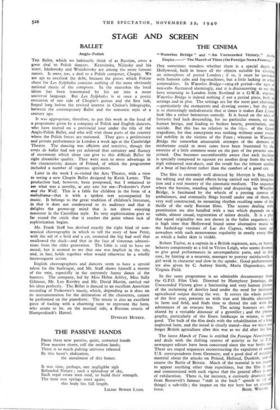THE CINEMA
"Waterloo Bridge" and "An Unrecorded Victory." At the Empire.-" The March of Time (On Foreign News Fronts), ONE sometimes wonders whether there is a special depot in Hollywood, built to house all the objects suitable for creating an atmosphere of period London ; if so, it must be crowded with hansom cabs and fog-machines, but a little lacking in other commodities. In Waterloo Bridge-1914-18 period—the ages of taxi-cabs fluctuated alarmingly, and it is disconcerting to see the hero returning to London from Scotland in a G.W.R. express. Waterloo Bridge is indeed nothing if not a period piece, both in settings and in plot. The settings are for the most part charming —particularly the restaurants and drawing rooms ; but the plot is so shatteringly melodramatic that at times it makes East Lynne look like a rather boisterous comedy. It is based on the idea of fantastic bad luck descending, for no particular reason, on two human beings, and leading to broken hearts, prostitution, and suicide. But this has no relation to the Zlipv; of the Greek tragedians, for that conception was nothing without some essen- tial nobility in the victims of the Fates ; whereas in Waterloo Bridge the somewhat amateurish attempts of the demons of misfortune could in most cases have been frustrated by the exercise of a little common sense on the part of the persons con- cerned. One becomes uncomfortably aware that each incident is specially composed to squeeze yet another drop from the well- nigh exhausted tear-ducts, and the result has the irritant quality of a bout of hay-fever rather than the comfort of a good cry.
The film is extremely well directed by Mervyn le Roy, both the editing and the sound effects being carried out with imagina- tion and a real mastery of the cinematic medium. The sequence where the heroine, standing solitary and despairing on Waterloo Bridge, is fascinated by the wheels of a passing convoy of ambulances, and eventually flings herself under one of them, is very well constructed, its mounting rhythm recalling some of the thrills of the early Russian films. The scenes dealing with prostitution are also handled with a tact which depends on a subtle, almost casual, registration of minor details. It is a pit that equal originality was not shown in the ballet sequences ;
is high time that Hollywood found some alternative music t the hashed-up versions of Lac des Cygnes, which turn up nowadays with such monotonous regularity in nearly every film in which a ballet skirt is visible.
Robert Taylor, as a captain in a British regiment, acts, or better, behaves competently as a foil to Vivien Leigh, who seems doomed to give good performances in unsympathetic parts, and in this case, by hinting at a neurosis, manages to portray satisfactorily a girl weak in character and slow in the uptake. Good performances are also given by C. Aubrey Smith, Maria Oupenskaya, and Virginia Field.
In the same programme is an admirable documentary from the G.P.O. Film Unit. Directed by Humphrey Jennings, An Unrecorded Victory gives a fascinating and very human pictur of the reclaiming of derelict land under the need for increas agricultural output during the war. It covers the whole peni of the first year, presents us with true and likeable character in farm and field, and finds time to thread the tale with th adventures of an evacuee boy. The acting honours are Os shared by a veritable dinosaur of a gyrotiller ; and the pho graphy, particularly of the Essex landscape in winter, is ye good. The bulk of the film deals with the rehabilitation of a Ion neglected farm, and the moral is clearly stated—that we must no forget British agriculture after this war as we did after the last.
The latest March of Time is entitled On Foreign Newslronts and deals with the shifting centres of activity as far as U.S. newspaper editors have been concerned since the war broke out. There are staged sequences reconstructing the expulsion of note U.S. correspondents from Germany, and a good deal of actuali material about the attacks on Poland, Holland, Dunkirk, and course the Battle of Britain. Much of the material is too receo to appear anything other than repetitious, but the film is 01 and commentated with such vigour that the general effect is 00 force. a curiously dramatic ni
of exhilaration. There is, for instance, from Roosevelt's famous "stab in the back" speech to (of things) a sub-title ; the impact on the eye here has an unusu BASIL WRIGHT.


























































 Previous page
Previous page